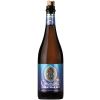Brouwerij Corsendonk - Christmas Ale
-
ABV:
8.5% -
Bottle Size:
750-ml -
Serving Temperature:
44–55° F -
Suggested Glassware:
Tulip, Goblet, or Chalice
Corsendonk Christmas Ale pours a deep mahogany brown with ruby undertones and a dense, creamy tan head that leaves intricate lacing with each sip. The aroma bursts forth in a swirl of dark caramel, dried fruits, cocoa, and warming spice, evoking freshly baked holiday bread. Initial notes of toffee, fig, raisin, and molasses are underscored by gentle accents of clove, nutmeg, and cinnamon, reminiscent of mulled wine and spiced fruitcake. Hints of brown sugar, roasted hazelnut, and candied orange peel emerge as the beer warms, unveiling deeper layers of complexity.
The first sip reveals a full-bodied malt core balanced by delicate carbonation and subtle hop bitterness. Rich flavors of date, plum, and dark chocolate unfold across the palate, supported by yeast-driven spice and a trace of black pepper. A touch of warming alcohol rounds out the profile, creating a velvety mouthfeel and lingering finish. Each taste feels both comforting and celebratory — an indulgent nod to Belgian brewing tradition, crafted for cold winter nights and shared moments.
Corsendonk Christmas Ale ages gracefully for up to three years, evolving into deeper sherry and dried-fruit tones. Serve in a chalice at cellar temperature. Pair with roast duck, glazed ham, or beef stew, where its sweetness complements savory depth. For dessert, enjoy alongside gingerbread, spiced pear tart, or dark chocolate truffles for a decadent winter pairing.
Like most Belgian abbey-style beers, the roots of Corsendonk go way back. The Priory of Corsendonk was founded in 1398 by the daughter of John III, Duke of Brabant in the Flemish town of Oud-Turnhaut, and the monks of this monastery brewed beer as was customary throughout Flanders and Europe in general. The monastery, and its beer, flourished for almost 400 years until it was closed by Austrian emperor Joseph II in 1784. In the wake of the French Revolution in 1789, the monastery and all its property was seized and sold off. The monastery saw new life when its buildings were restored in 1968, evolving into a conference center, hotel, and restaurant complex over next several years.
Similarly, the priory's beer has experienced a restoration as well. A new breath of life came to Oud-Turnhaut and its brewing tradition when Sir Henricus Keersmaekers founded a new brewery there in 1906, and he kept the abbey beer tradition alive. But, when the family brewery closed in 1953 it appeared the beer would again be lost to history, and indeed it was for almost three decades until Henricus' grandson, Jef Keersmaekers, revived the brand yet again in 1982. Because the family no longer owned a brewery, Jef partnered with another family brewery, Brasserie du Bocq, to brew the Corsendonk beer.
Brasserie du Bocq was founded by Martin Belot in 1858 in the tiny town of Purnode in the Walloon province of Namur. Originally brewing was a winter hobby while his farm was not producing and his workers idle, but due in no small part to the outstanding well water found on the farm, the beer was commercially successful. There were many beers on offer from Brasserie du Bocq, such as strong beers, seasonal beers, and celebratory Christmas beers. Today, the Keersmaekers family has taken over the brewery from the sixth generation of the Belot family producing all the Brasserie du Bocq brands alongside the Corsendonk beers. A traditional Belgian brewery, all du Bocq's beers are bottle-conditioned, experiencing a secondary fermentation in the bottle to naturally carbonate the beer.

Unmatched Variety by style, brewery & country
Choose from Five different Beer Clubs offering unmatched variety by brewery,
country of origin, and beer style to suit your specific tastes.


